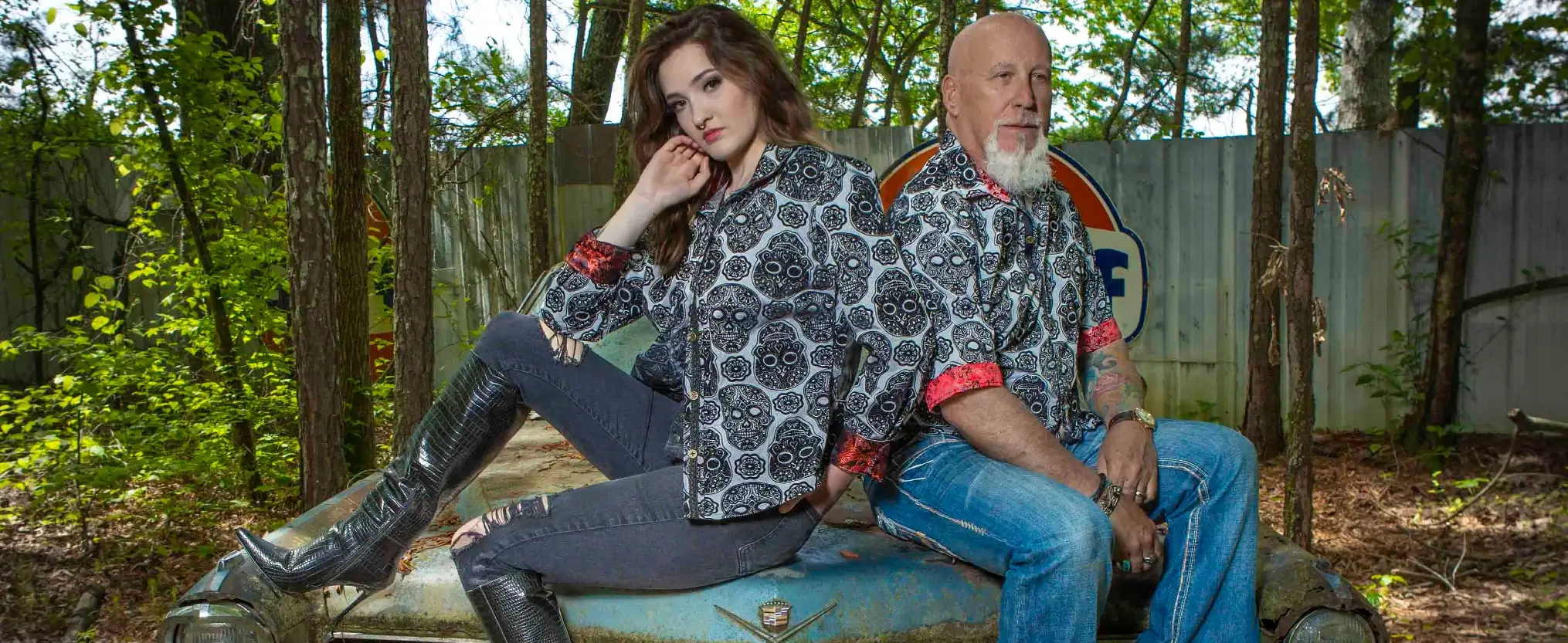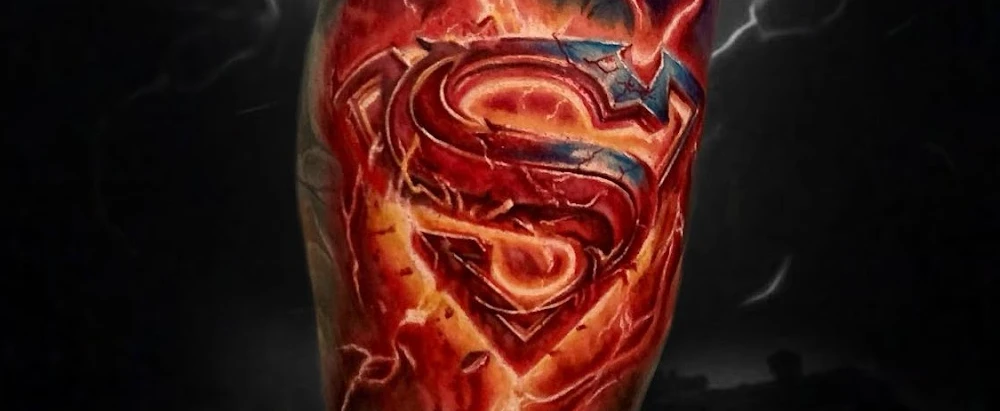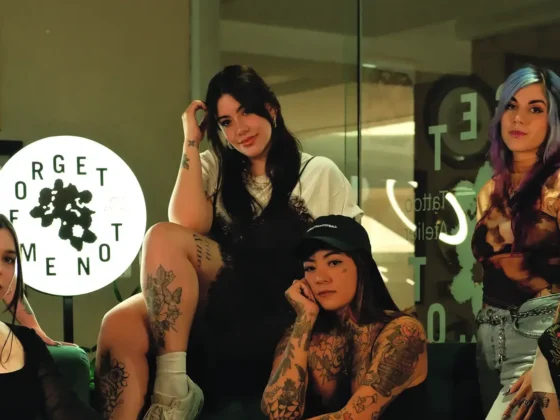Inked Mag Staff
February 16th, 2024
Visibly Inked in Denmark
Many Consider the Country’s Law Against Face, Neck and Hand Tattoos to be Outdated

By Katie Sawyer
“In the beginning, it was like a whole new world,” Mads Kjær said, leaning back on a park bench in Aarhus, Denmark, a cool autumn breeze rumpling his jacket. Peeking out from underneath his collar, an inky, dark forest of tattoos on his skin is just visible. His hands, folded casually in front of him, bear a mixture of lines and skulls, with a letter on each finger of his left hand—spelling out the name of his son Aros.
Perhaps most stunning tattoos of all, however, are the two straight black lines that run down his face from just under his eyes, parallel to one another. “Now it’s like part of the day,” he finishes. Kjær is stopped regularly by people in the streets of Aarhus. Some insult him openly, asking him, “Why would you mess up your face with something ugly like that?”
Kjær is an Afghanistan war veteran and a father. He is covered in tattoos, but it’s the addition of his face tattoos four years ago that turns heads the most. “This one is a little depressing, actually. I was in a sad moment of life,” Kjær said.
Face tattoos, along with neck and hand tattoos, are illegal to perform in Denmark. It’s a law that goes back decades to 1966 when the Danish Parliament officially outlawed them. Ironically, former Danish King Frederik IX had several tattoos at the time, some given to him by the second-oldest tattoo parlor in the world, Tattoo Ole, located in Copenhagen. The law was renewed in 2018, with some pushback from local tattoo parlors and citizens with tattoos who feel the law represents an old ideal.

Today’s Tattoos
Magnus Aargaard-Nielsen, co-owner of Aarhus tattoo parlor Venlig Hilsen, said local tattoo culture in Denmark has changed dramatically and this law no longer represents Danish society. “The law tries to dictate conscience or morality… I think the reason it’s really in there is to sate some people on the more conservative side of the Danish Parliament,” said Aargaard-Nielsen. “I find it to be not the government’s place to dictate.”
Aargaard-Nielsen has performed face, neck and hand tattoos in his career as an artist, and he accepts them on a case-by-case basis. “I’ll tattoo you on the hand,” Aargaard-Nielsen said. “Not if you’re young, and you don’t know what you’re doing with your life and it’s one of your first tattoos.”
Judgment of the Jugular
Venlig Hilsen translates to “kind regards,” and it’s reflected in Aargaard-Nielsen’s welcoming attitude toward those who enter his shop. He doesn’t have any visible tattoos, but shop manager Anders Husum is nearly covered from head to toe. Husum started his tattoo journey when he was still underage, ordering a tattoo gun and tattooing the number 13 on himself at home. “I like that I stick out from the average Joe, and being the kind of person that breaks down the prejudice,” Husum said.
On his right hand, the father-of-five sports a multicolored tiger tattoo, and on the left, a snarling dog in a beanie. Scribed across his knuckles are the words “TRUE GENT.” His neck tattoos extend up into his hairline, and down onto his cheekbones—a mix of nautical and floral artwork. Husum was surprised when the law against face, hand and neck tattoos was renewed in 2018, and said he would like to see it repealed.
Husum has been called a criminal and a gang member before while out in public, and says he is regularly turned away from bars and clubs in Denmark’s Aarhus area. Still, Husum has no regrets about his decision to get tattooed and is currently working on his newest tattoo—a large chest piece of a ship.

Regrets and Removals
Many of Kjær’s tattoos have great meaning to him, like his son’s name written across his knuckles. He said his kids love his tattoos, especially the ones of animals—pointing out a blue and black shark grinning from the back of his left hand. But having experienced judgment for his face tattoos, Kjær said he can understand the importance of preventing young people from getting a visible tattoo that could alter their life permanently. “Now, because I have seen on myself that people are very judgmental, I think it’s good that young people don’t just go get a neck tattoo,” Kjær said.
Jesper Schumann, owner of Remove-It tattoo removal clinic, makes his living off of customers who are unhappy with their tattoos. He estimates around five to ten percent of his clientele is made up of people who have face, hand and neck tattoos. From drunken mistakes to changing perspectives, his clients come in to get a tattoo removed for a variety of reasons.


“When you get a tattoo you’re at a certain place in your life, and 10 years after you’re not in that same place,” Schumann said before adding jokingly, “Maybe people regret their wild youth.”
Remove-it actually shares a space with several local tattoo artists, something Schumann recognizes the irony of. However, the two work well together as Schumann’s laser services can help lighten a tattoo a customer would like covered up with new artwork, and the resident artists can then tattoo the client’s desired art on top.
There are often social and professional impacts that lead to someone getting a tattoo removed, according to Schumann. “Especially the visible ones on the throat, face and hands, because they look like some badass person maybe. Or maybe it’s because of a job.”
The law against face, hand and neck tattoos is good for business, says Schumann, as many customers come in looking to remove them later in life. Despite the benefits to his business, Schumann would like to see the law against hand, face and neck tattoos abolished. “For me, I think it’s totally fine. People can have it, I’m not a judgmental person,” Schumann said. “No matter your job—you could be a policeman with hand tattoos and I wouldn’t think that was a crime. I think it should be legal.”
While the social reality for some with visible tattoos in Denmark is still frustratingly judgmental, people like Kjær remain hopeful for a better future.
“I think it’s going to change,” Kjær said. “I think in 10 years from now, it will be normal, because more people are getting tattoos.”
Editor's Picks
Bridging Classical Art and Modern Tattooing
Esteban Rodriguez brings the discipline of classical fine art to the living canvas of skin, creating hyper-realistic tattoos that merge technical mastery with emotional depth.
Show Your Ink Fashions Brings Custom Style to Tattoo Culture
Show Your Ink Fashions creates custom shirts designed to showcase your tattoos as wearable art, blending fashion with personal expression.
The Ultimate “Superman” Tattoo Roundup: Just in Time for Superman’s Return to Screens
With Superman’s big return to theaters, fans are revisiting some of the most iconic ink inspired by the Man of Steel.














